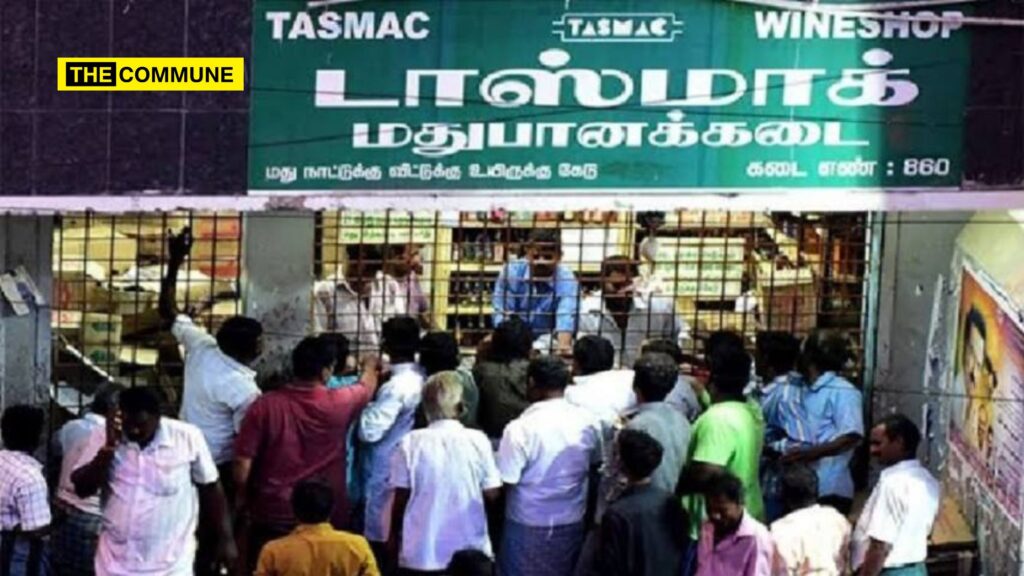The Comptroller and Auditor General (CAG) of India has released a report for the year 2021-2022 highlighting significant issues in the operations of the Tamil Nadu State Marketing Corporation Limited (TASMAC). The report, tabled in the Assembly, points out persistent problems with cash transactions, tender processes, and excise duty payments.
Predominance Of Cash Transactions
Despite efforts to encourage cashless transactions, the CAG report reveals that TASMAC outlets continue to primarily deal in cash. Point-of-sale (PoS) machines were installed in all TASMAC retail shops to facilitate cashless payments. However, out of 5,359 machines installed, only 3,114 were operational, with the remaining 2,245 machines inoperative due to technical issues. The report criticizes the lack of prompt action to restore these machines, which has indirectly encouraged cash transactions.
Additionally, TASMAC received numerous complaints regarding overcharging at its outlets. Out of 238 complaints, 177 were related to overcharging, exacerbated by the non-functioning PoS machines.
Outdated Procurement And Retail Vending Policy
The report also highlighted that TASMAC’s procurement and retail vending policy was outdated and lacks transparency. The corporation holds a monopoly over the procurement and vending of liquor, and the CAG suggested that TASMAC should adopt a fair purchase policy, treating all manufacturers equitably without showing favoritism. Additionally, the CAG noted that TASMAC’s end-to-end computerisation project has been delayed and urged the management to expedite its completion to establish an efficient Goods Monitoring System.
Tender Process And Potential Cartelization
The CAG report flags potential cartelization in TASMAC’s tender process for transporting liquor from depots to retail outlets. Despite the introduction of an e-tendering mechanism in December 2017, tenders continued to be awarded through physical bids. The report notes that the same entities frequently won these tenders, raising concerns about limited participation and potential collusion.
One successful bidder, who had been awarded tenders from 2019 to 2021 and had their contract renewed for 2021-23, did not possess the mandatory GST Identification Number (GSTIN). Furthermore, the fitness certificates and insurance of several trucks used for transport had expired, and one lorry registered on the VAHAN portal was actually a tanker. The CAG criticized TASMAC for not addressing these deficiencies and for failing to publicize the tender process widely to ensure broader participation.
Excise Duty Discrepancies
The CAG report also highlights that TASMAC failed to pay differential excise duty amounting to ₹30.5 crore due to revised rates of Indian Made Foreign Liquor (IMFL). While the Maximum Retail Price (MRP) was adjusted based on the revised excise rates, the corresponding excise duty payments were not made. This discrepancy was identified in eight out of 43 depots examined by the auditors.
The CAG report recommends immediate measures to restore non-functioning PoS machines to promote cashless transactions and address overcharging complaints. It also urges TASMAC to rectify shortcomings in its tender process by ensuring broader participation and transparency. Furthermore, the report calls for prompt payment of all due excise duties.
”அரசுக்கு வரி செலுத்தாத டாஸ்மாக்” டிஜிட்டல் முறையிலும் எக்ஸ்ட்ரா ரூ.10 வசூல்.. பகீர் தகவல்!#Taxevasion #TASMAC #CovidreliefFund #NewsTamil24x7 pic.twitter.com/rTq8oRouhY
— News Tamil 24×7 (@NewsTamilTV24x7) July 1, 2024
(with inputs from The Hindu)
Subscribe to our channels on Telegram, WhatsApp, and Instagram and get the best stories of the day delivered to you personally.

